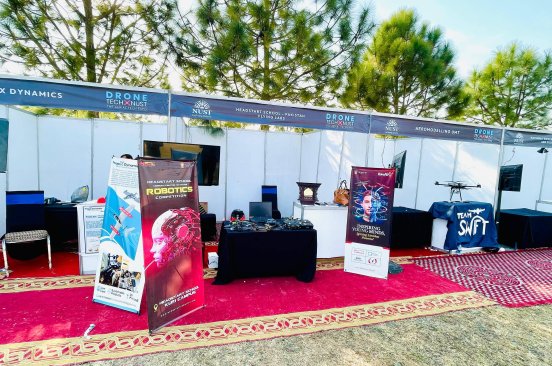
To Improve Smallholder Farmers Livelihood, Nigeria Needs to Embrace Smart Farming
The introduction of digital agriculture via the farm optimization model will facilitate the localization of mapping technologies for smallholder farmers.
March 25th, 2020
By Adewale Adegoke, Nigeria Flying Labs South West Hub
The digitalization of agriculture in Nigeria is a novel concept that struggles with existing regulatory and systemic constraints, business environment limitations, inadequate data transmission infrastructure, the capacity of smallholder farmers to keep records, the relatively low disposable income of smallholder farmers, and a restriction on technology acquisition. To overcome these challenges, we need a clear understanding of how digital infrastructure enables information and knowledge capable of achieving sustainable agricultural development, as well as job-creation for youth in the agricultural or non-oil sectors.
Agriculture is a significant contributor to the national and sub-national economy, as Nigeria had recorded unprecedented achievements in the agricultural sector, albeit 30-40 years ago, when oil was a significant revenue source. To continue unlocking the potentials of the sector, we need a data and technology-driven process continuum. Over the years, new concepts have evolved to serve as benchmarks for measuring impacts of technological innovation, and one such benchmark is the Sustainable Development Goals (SDGs). WeRobotics and Flying Labs are committed to social good and humanitarian projects that have SDG outcomes.
Recently, climate change has put increasing pressures on smallholder farmers, who are affected by low yield, poor market access, and practical uses of soil resources to optimize their crop production. To combat mounting unemployment in the Nigerian agricultural sector and improve productivity, Nigeria Flying Labs South West Hub pioneered technology-driven solutions that de-risk agricultural innovation, improve smallholder farmer livelihood, and create new job opportunities.
These markets, digital infrastructure, and systemic inefficiencies in the agricultural sector have created an opportunity for data integration into the agricultural value chain to catalyze transformative economic opportunities in the Nigerian agricultural sector. This opportunity has informed the drive to implement a Smart Farming Center at the Federal College of Agriculture Akure in response to the farm optimization model. Equipped with appropriate computer hardware, data processing software, and human capacity, the proposed Smart Farming Center would drive digital innovation in agriculture to achieve SDG 1: No Poverty, SDG 2: Zero Hunger, SDG 8: Decent Work & Economic Growth, and SDG 13: Climate Action.
This partnership and integration of smart farming components into the academic institution's existing capacity strengthens the farm optimization model's ability to deliver measurable value in the agricultural sector.
With 36 states and federal colleges of agriculture across the country, Nigeria has large youth demography that can foster technology transfer and drive the localization of technology among smallholder farmers in Nigeria via e-extension services. Agricultural extension services are vital to promoting a feedback loop for smallholder farmers, where the extension staff use real-time and offline mobile applications to collect data on pests, farm boundary maps, crop productivity and health, among other indicators to benefit farmers.
A mobile application was developed on ESRI Survey 123 to aid assisted record-keeping on behalf of smallholder farmers, as shown below.
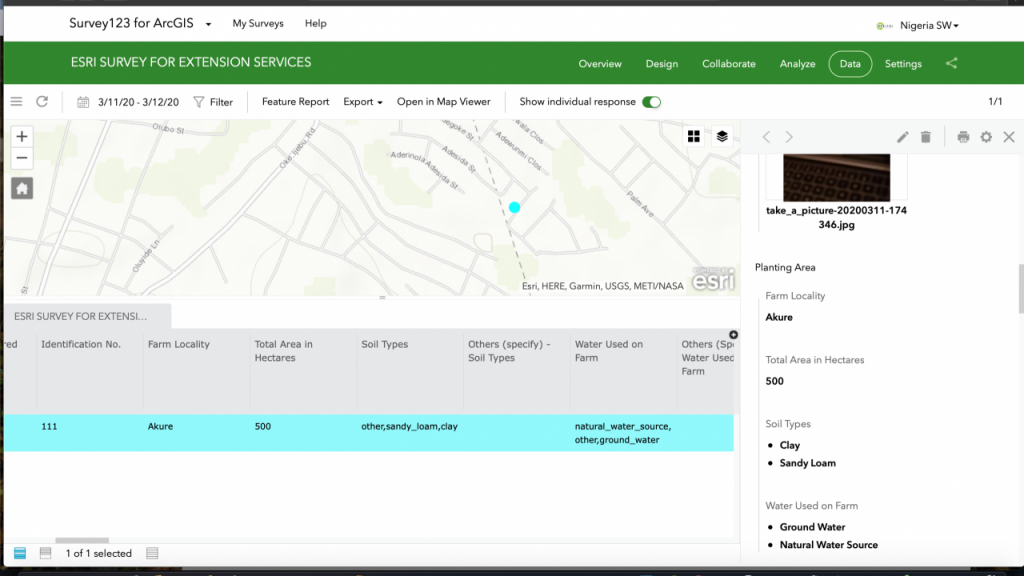 Figure 1.0
Figure 1.0
The pieces of the puzzle come together at a smart farming advisory technical advisory center, an output of the partnership that will be domiciled at the Federal College of Agriculture Akure. The Smart Farming Technical Advisory Center will offer the following services that include drone and agribusiness capacity building, extension services, technology-driven agronomy service advisory, research and development that will be focused on robotics, artificial intelligence, spatial data science and remote sensing technologies, data and processes in agriculture.
The key expected impact of the Smart Farming Advisory and Technology Center is to improve smallholder farmer livelihood while creating job opportunities in e-extension services for the youth.
As a point of entry, Flying Labs Nigeria Southwest Hub conducted a one-day seminar attended by over 100 higher national diploma students, on introduction to robotics, AI, data science, and remote sensing in agriculture, with an emphasis on the drone technology for monitoring crop health. Below are photos from the seminar and field demonstration.
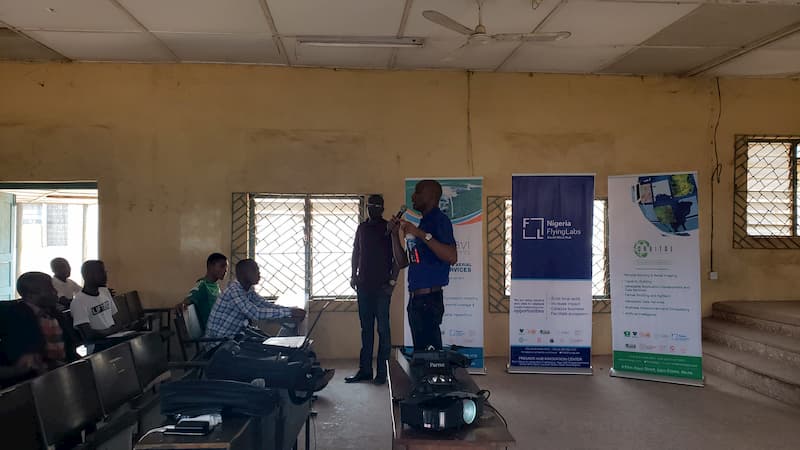
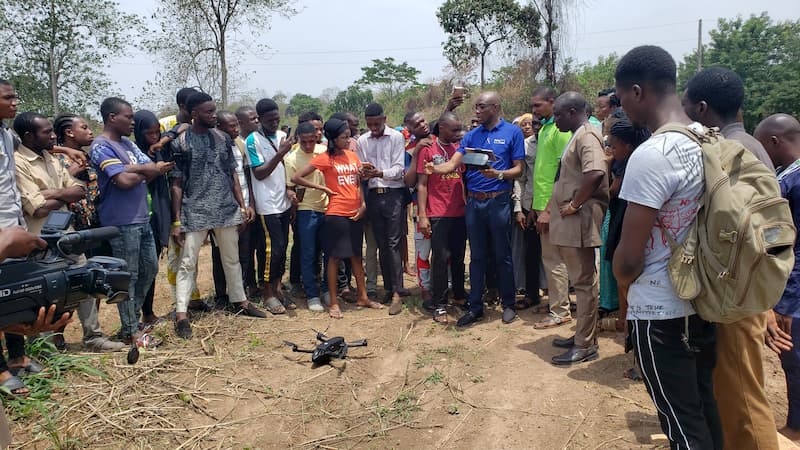
The Parrot Bluegrass multispectral drone demonstrated how quick response to field variability could be achieved. The drone flew over students' cassava farms of an area of 188 square meters, for four minutes, at an altitude of 43.8 meters, capturing 309 images within five bands that include RGB, red edge, green, near-infrared, and red.
Below are the mosaiced aerial orthophotos before and after transformation using Normalized Differential Index as measurement indices for biomass measurement.
The data was processed using Agisoft Metashape professionals to generate the NDVI. The NDVI crop health index is the most common index used for measuring the vigor of a plant-based on how strongly the leaves reflect Near-Infrared and absorb red. It allows the e-extension staff to demonstrate the field variability for the farmer and agronomist, culminating in cost reduction in fertilizer application to a field and sustainable agricultural practices. This results in the collection of historical data on crop productivity and soil performance to facilitate compliance.
A significant benefit and incentive for the farmers is the capacity to produce in compliance with market standards. The farm optimization model is expected to establish market access for the farmers. A core requirement is the involvement of an existing farmer cooperative as a means of coordinating the farmers to build their capacity on good agronomic practices and schedule farm visits by extension staff.
The introduction of digital agriculture via the farm optimization model will facilitate the localization of drone and other mapping technologies for smallholder farmers. This would help smallholder farmers access markets and improve their livelihoods under the auspices of the Smart Farming Technical Advisory Center that will create job opportunities in e-extension service delivery for the youth.
Category(s)
Recent Articles
View All »
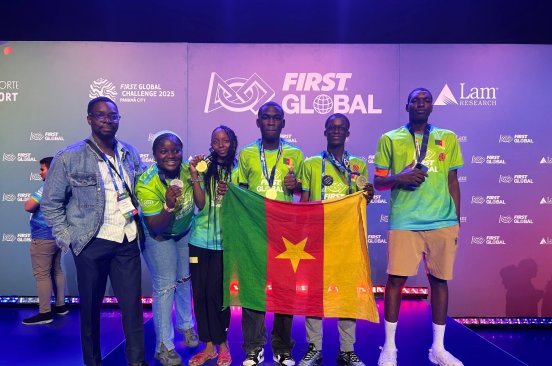
Team Cameroon's Road to Victory at the First Global Robotics Competition 2025
